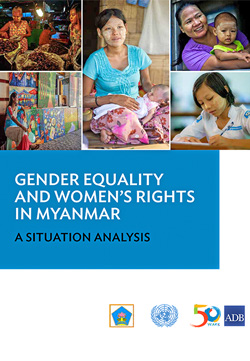
Gender Equality and Women’s Rights in Myanmar: A Situation Analysis

Myanmar is in rapid political and economic transition, with a triple-reform agenda focused on democratic governance and rule of law; national unity and peace via reconciliation with political parties and ethnic armed organizations; market-oriented economic adjustments, inclusive growth, bottom-up planning and decentralization; improved management of government institutions; collaboration with the international community and Myanmar’s diaspora; and removal of media censorship.
Notable advances include (i) a new Constitution, general elections, fair Parliament by-elections in 2012 and in the national general elections of November 2015; and a convening Parliament; (ii) releasing of political prisoners; (iii) legal reforms; (iv) establishing institutions to protect constitutionally guaranteed fundamental human rights; (v) a pluralistic media; (vi) abolishing prepublication and most internet censorship; (vii) restoration of the census; (viii) bilateral ceasefire agreements with 14 ethnic groups and a prospective nationwide ceasefire agreement; (ix) increased private sector investment, economic diversification, investments in agriculture, rural development, and high value-added sectors; and (x) financial infrastructure reforms.